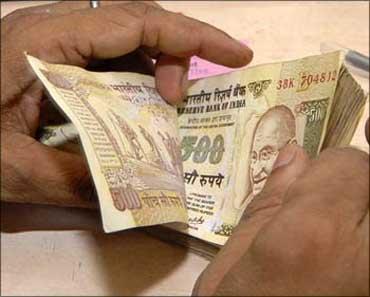Photographs: A dummy's guide to G-Secs investment Anjali Mullatti
Before any further explanation, it's important to understand what government securities (G-Secs) are. These are borrowing instruments issued by the government through the Reserve Bank of India (RBI) for funding its fiscal deficit.
The RBI issues these securities via an auction mechanism through out the year on a calendar schedule.
Next, G-secs are totally default risk-free. The government of India has no risk of default. If they don't have the money, they can simply print it!
However, as they are risk free they also offer the lowest return, based on the simple risk-return principle. Lower the risk associated with an instrument, lower will be the return.
Right. So, why can't I invest in these securities?
...
The author is CEO of learnwithflip.com
A dummy's guide to G-Secs investment
Image: G-secs come without tax benefits.First, it is mainly an institutional market and the minimum size of the lot traded is very high. A typical transaction is to the tune of Rs 5 crore (Rs 50 million).
You can place an order to buy a smaller amount, say Rs 10 lakh, with your bank. This may occur only if such an odd lot is available, with another retail investor looking to sell a similar or larger amount at the same time.
This brings us to the other key issue, liquidity. If you wish to buy and hold the security till maturity, you can easily do that. But, in case you wish to sell those mid-way (before maturity) due to an emergency, you can't for it is not allowed. That is the biggest drawback of the product for retail investors.
G-secs come without tax benefits as is possible in other government investment schemes. You pay tax on the interest earned based on your income tax slab.
...A dummy's guide to G-Secs investment
Image: Earn more money.But, if you still want to go ahead and invest in G-Secs, this is what you need to do. To begin, you need to open a Constituent Subsidiary General Ledger Account (CSGL) account with a bank, which is similar to a demat account.
HOW DOES CSGL WORK?
You can approach RBI through your bank and buy G-Secs during an auction through a non-competitive bid.
This ensures you get to buy the amount you want but at the weighted average cut-off price of competitive bids. Example: The auction is for Rs 100 crore at 7.8 per cent for 10-year bonds.
Bank A bids Rs 50 crore at Rs 101 and Bank B bids at Rs 100. The cut-off price is Rs 100 and both bids are accepted. This is called a Dutch Auction, where both banks get G-Secs at the same cut-off.
...
A dummy's guide to G-Secs investment
Image: Interest income will be taxable.You also get your amount, but at a weighted average price of Rs 100.50. You will earn interest at 7.8 per cent annually on the face value (Rs 100). The interest income will be taxable and you will need to hold it to maturity, that is, 10 years.
The RBI also issues shorter maturity G-Secs called Treasury Bills (T-bills) that are each of 91-, 182- and 364-day durations. You can buy these as well, in a similar manner.
The only thing is that you will need to inform your banker. Who, in turn, will tell you about the next RBI auction. Complicated, but not difficult to execute.
...A dummy's guide to G-Secs investment
Image: Face no liquidity risk.How? Buy units of a gilt mutual fund, a scheme that invests only in G-Secs. You get all the benefits - easy liquidity, small lot size and no operational hassles. The only caveat is, while the no-default risk still holds, you run some market risk here. G-Sec price can go down and you may incur a loss, as true for all market investments.
Funds like DSP Blackrock Govt Securities Fund and HDFC Gilt Fund Short Term are some of the gilt funds in the market at present.







article